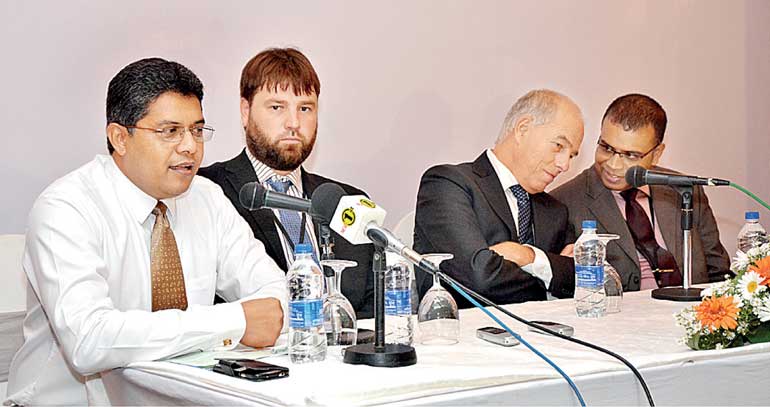Sunday Feb 22, 2026
Sunday Feb 22, 2026
Wednesday, 18 November 2015 00:37 - - {{hitsCtrl.values.hits}}
 Waste Management Authority Director Nalin Mannapperuma addressing the press conference last morning. Others from left: People in Need Project Manager Petr Drbohlavm, Netherlands Development Organisation Renewable Energy Sector Senior Strategy Officer Wim J. van Nes and Janathakshan Gte CEO Ranga Pallawala – Pic by Upul Abayasekara
Waste Management Authority Director Nalin Mannapperuma addressing the press conference last morning. Others from left: People in Need Project Manager Petr Drbohlavm, Netherlands Development Organisation Renewable Energy Sector Senior Strategy Officer Wim J. van Nes and Janathakshan Gte CEO Ranga Pallawala – Pic by Upul Abayasekara
By Shiran Illanperuma
A five-year “master plan” has been structured to sweep up the streets of the Western Province while harnessing waste for energy generation, Waste Management Authority Director Nalin Mannapperuma revealed last morning.
Currently the Western Province alone produces around 60% of the nation’s waste, with a whopping 3,400 metric tons produced per day, according to Mannapperuma. As it stands very little of this waste is managed in a sustainable manner. “About 86% of waste is dumped out in the open. Only about 6% of this is made into compost and about 4% of it is recycled. This situation has to change,” asserted Mannapperuma.
Admitting that the Government had not taken sufficient decisive action to address these issues, Mannapperuma said that the plan would help clean up the Western Province while producing an alternate source of sustainable energy in the form of biogas.
“We have planned to double composting and increase recycling to 12% by 2020. Furthermore, around 47%-50% of our waste can be used to generate energy,” he said.
This potential revolution in domestic waste management could be a boon to the developing island’s rising demand for energy.
“Currently thermal power takes up as much as 44% of energy generation costs in Sri Lanka. We are heavily dependent on petroleum, but resources are expected to run out by 2040 and we have to move towards sustainable energy in line with the national policy on renewable energy,” said Mannapperuma.
In terms of practical applications for biogas energy, SNV Netherlands Development Organisation Senior Strategy Officer for Renewable Energy Wim J. van Nes said that for countries like Sri Lanka with small-scale systems, cooking may be the best application. “But if you produce larger amounts of biogas, you can also think about conversion into electricity through generators. Those kinds of systems take place more at the medium- and large-scale level,” he said.
Meanwhile, Janathakshan CEO Ranga Pallawala commented on the difficulties in setting up capacity for biogas infrastructure in Sri Lanka. “One problem is the lack of local awareness. Secondly, there is the problem of a lack of technical expertise. But this is now being filled by partnerships with different private and public organisations,” he said.